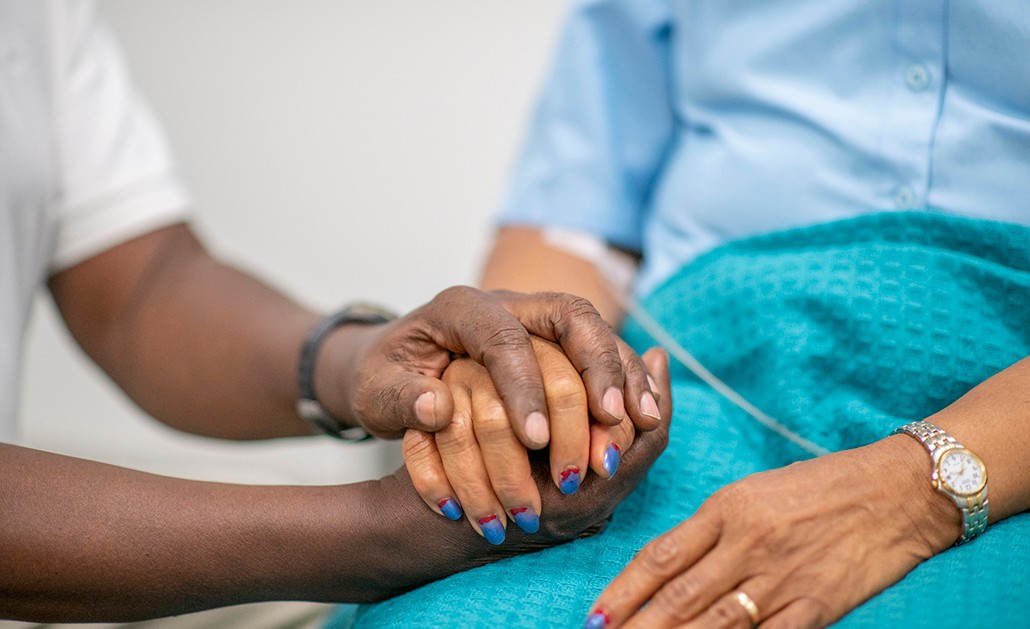
A medical professional comforts a patient during the coronavirus pandemic. Photo by iStock.
The coronavirus pandemic has exacted a huge psychological toll on doctors, nurses, and emergency medical technicians, say Rachel DiBella and Brooke Huminski, psychotherapists who graduated from the Boston College School of Social Work in 2014.
Healthcare workers who have witnessed scores of patients succumb to COVID-19 have reported increased levels of panic, grief, and irritability. One new study found that a large proportion of healthcare workers in China who have treated coronavirus patients are now suffering from anxiety, depression, and insomnia.
Lorna Breen, a doctor who directed the emergency department at NewYork-Presbyterian Allen Hospital in Manhattan, compared the relentless horror of the pandemic to “Armageddon” and then committed suicide. Although the cause of her suicide remains unknown, her death has shined a light on the mental health of medical professionals who have worked on the frontlines of the pandemic, said Huminski, who runs a private practice in Rhode Island where she specializes in anxiety, depression, and eating disorders.
“Healthcare workers are struggling and dealing with death on a daily basis,” she said. “Many don’t feel like they have anyone to talk to or anyone who understands them.”

Brooke Huminski
To address this problem, Huminski and DiBella teamed up to create a virtual workshop to teach a group of 30 social workers the principles of cognitive processing therapy, a form of psychotherapy that focuses on helping people modify unhelpful patterns of thinking created by trauma. Social workers can use the strategy, they say, to help treat healthcare professionals who have developed post-traumatic stress disorder as a result of the pandemic.
“The function of this group was to be part academic study, and part experiential,” said DiBella, a part-time faculty member in the School of Social Work who specializes in group therapy and sexual trauma. “This was not a treatment group, but rather a group for those eager to develop new strategies to support clients in a trauma-informed community.”
The workshop spanned 10 hourlong sessions and covered the entirety of Cognitive Processing Therapy for PTSD, a training manual written by the therapists who created the treatment. One lesson centered on the strategies that social workers can use to help their clients dismantle the notion that they will never be safe, which, DiBella says, is a commonly held belief among people who suffer from PTSD.
“People living with the neurological and physiological effects of PTSD tend to think of safety in all or nothing terms,” she said. “Safety becomes a binary concept where things are either safe or not safe and that limits how we live our lives.”

Rachel DiBella
Huminski and DiBella surveyed the social workers who participated in the workshop and discovered that 100 percent of respondents would be “extremely or somewhat likely” to use cognitive processing therapy in their practice.
“I intend to use CPT, and I think it will feel more comfortable as I go through it,” one participant said. “I believe this has given me the solid foundation that I need.”
Karen Chinca, a psychotherapist who runs a private practice in Brookline, Massachusetts, said that she has already used the treatment protocol to help two clients process trauma caused by sexual assault.
“They have really shifted some of their thinking and beliefs they hold around feeling responsible for their trauma,” said Chinca, who graduated from the School of Social Work in 2004. “I used CPT to help them recognize that they couldn’t have done anything differently and weren’t responsible for what happened to them.”
Chinca said that now—as deaths caused by the coronavirus surpass 120,000 in the United States and calls for racial justice reach a fever pitch—is the perfect time for social workers to learn the ins and outs of cognitive processing therapy. “A lot of frontline healthcare workers are experiencing trauma, and many of my Black clients and clients of color are experiencing systemic racism,” she said. “Now more than ever is the time to learn this protocol.”


